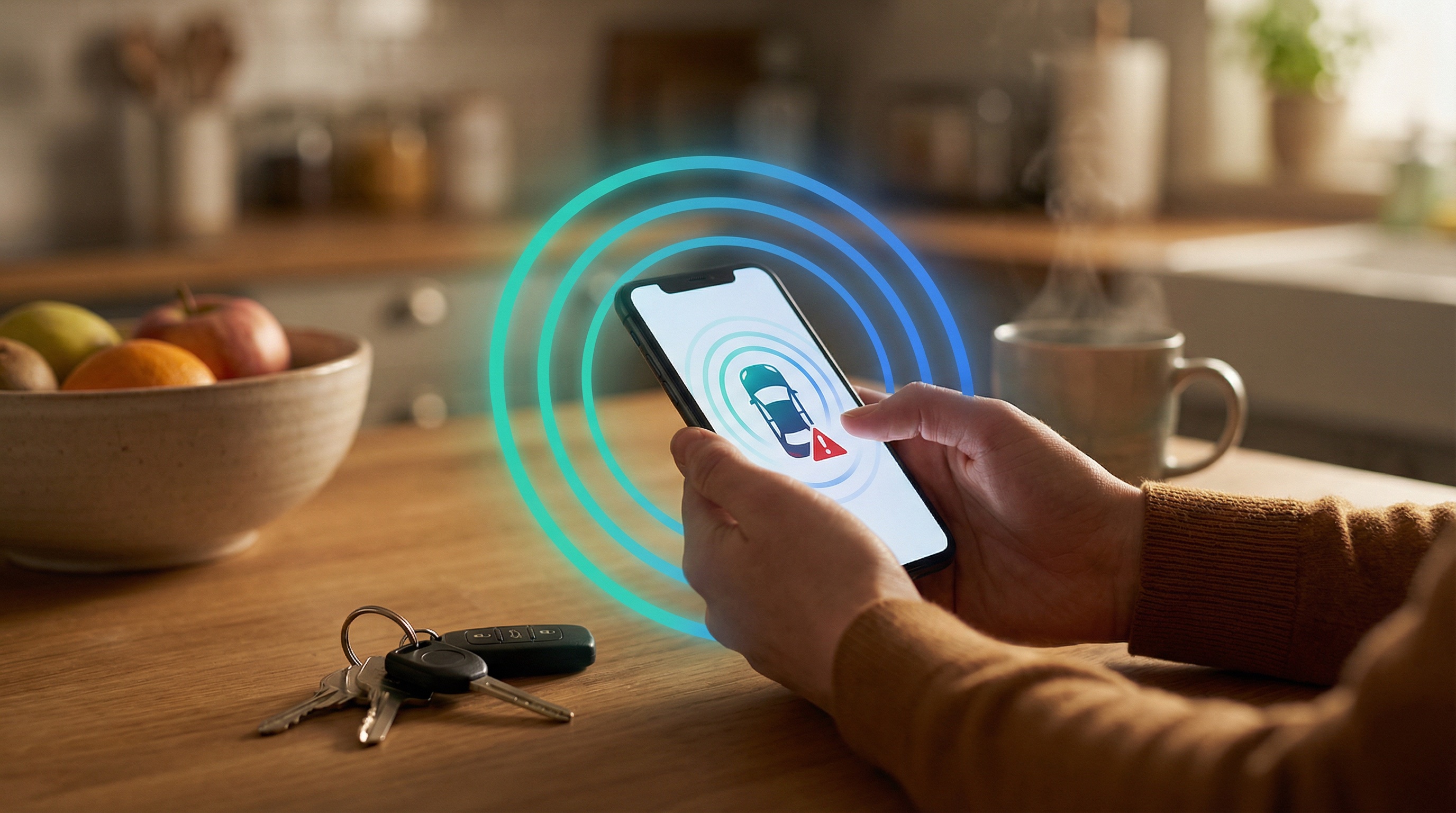Free iPhone Scams: How to Spot Them & Stay Safe

Key Takeaways
- Free iPhone = Big Red Flag: If someone claims you're getting a free iPhone without entering a contest, it's a scam. Scammers use fake giveaways to steal your info.
- Scammers Are Getting Smarter: In 2024, they used deepfake videos and personalized phishing messages to trick people, making scams harder to spot.
- Look for the Warning Signs: Sketchy links, urgency, spelling errors, and requests for payment info are all signs something’s not right.
- Easy Ways to Protect Yourself: Don’t click on strange links, always verify URLs, and turn on two-factor authentication for your accounts.
- Cybersecurity Tools Help: Using tools like Guardio can block scam sites, filter phishing messages, and alert you if your info is compromised.
’Tis the season of the new iPhone release— new features, new designs, and for iPhone fanatics and techies alike, it’s like Christmas morning. But sadly, just as predictably, scammers are waiting in the wings, ready to cash in on the hype. Like clockwork, every new iPhone launch brings with it a flood of fake giveaways, sketchy pre-orders, and phishing scams disguised as too-good-to-be-true offers.
In this article, we’ll explore how these free iPhone scams rear their ugly heads with each iPhone release, what warning signs to look out for, and why using cybersecurity tools like Guardio is essential in keeping your personal information safe from these ever-evolving threats.

{{component-cta-custom}}
What’s the Deal with Free iPhone Scams? A Quick Overview
If you’ve ever scrolled past an ad promising a free iPhone and thought, this can’t be real, you’re absolutely right. Free iPhone scams are a modern-day con artist’s dream—disguised as giveaways, promotions, or early pre-orders, they’re designed to trick you into handing over personal info, payment details, or both.
Here’s how they usually work: You see an offer for a shiny new iPhone, but there’s a catch. Maybe it’s a fake iPhone giveaway asking you to “claim your prize” by entering your details. Or perhaps it's a phishing scam link that leads to a convincing Apple lookalike site, complete with logos and fine print. These scams can also take the form of survey websites, where you’re promised an iPhone in exchange for answering a few “harmless” questions—only to find out you’ve just handed over your name, email, and credit card info to a scammer.
And let’s not forget about social media scams. Scammers love using platforms like Facebook, Instagram, and TikTok to spread their fake offers. They’ll run ads, create posts, or even hijack popular hashtags to make their scams seem legit. Sometimes, they even use fake influencer accounts or deepfake videos to boost credibility, tricking users into thinking their favorite tech guru is endorsing the fake prize scam. It’s all designed to lure you in with just one innocent click.
All it takes is a tap, and before you know it, your personal data is in the hands of a cybercriminal. And no, there’s no iPhone in the mail—just the sinking feeling that you’ve been had.
Clicked a sketchy iPhone giveaway link? With Guardio, you see a block screen, not a scam form. The site never loads.
The iPhone is Back, And So Are the Scams: 2024 Edition
With the release of the new iPhone in 2024, scammers are sharpening their tools and getting creative. The free iPhone scam is back with a vengeance, and this time, the tactics are even sneakier. In a year marked by economic uncertainty and a surge in online activity, scammers are capitalizing on people's desires to score big for free—whether it’s through fake crypto giveaways tied to bogus Apple events or too-good-to-be-true pre-order deals.
What’s different this time? Scammers are leaning heavily into tech that’s as cutting-edge as the iPhone itself. Deepfake videos of Tim Cook promoting “exclusive offers” are making the rounds, fooling even the most savvy users. Add to that the growing trend of personalized phishing attacks, where scammers tailor messages to individual targets, making the scams feel eerily legitimate.
The economic pinch of 2024 has made these scams even more appealing, as people are eager to save money on high-end gadgets. And with more of our lives happening online—whether shopping, working, or doom-scrolling—there are even more opportunities for scammers to strike. The result? A perfect storm for digital fraud, with free iPhone scams leading the charge.
OK, But What Happens if I Fall for the Scam?
Falling for a free iPhone scam isn’t just about missing out on a shiny new gadget—it’s about giving scammers a free pass to your most valuable assets. Once you’re hooked, they can steal your personal information, swipe your cash, and even commit identity theft. That innocent click could open the door to fraud, credit card theft, or worse, with your data being sold on the dark web. So, while you may not get that iPhone, the scammers sure get a lot more than they bargained for—at your expense.
Seven Signs You’re About to Fall for a Free iPhone Scam
Think you’ve spotted a legit offer for a free iPhone? Hold up! Scammers are pros at making fake giveaways look too good to resist. But don’t worry—here are the top seven iPhone scam alerts that scream “scam alert!” so you can avoid becoming their next victim:
1. It’s too good to be true – A free iPhone? Really? Legit companies don’t just hand out expensive gadgets to random strangers.
2. You didn’t sign up for it – If you’ve never entered a contest or promotion, there’s no way you could win a free iPhone.
3. Spelling and grammar mistakes – Scammers often slip up with poorly worded messages or typos. Major companies don’t mess this up.
4. Sketchy URLs – Phony links like “iPh0ne-win.com” are a classic scam tactic. Hover over the link to see where it really goes.
5. Urgency or pressure tactics – “Hurry! Claim your prize now before it’s too late!” Scammers want you to act fast without thinking.
6. Requests for personal or payment info – If they ask for credit card numbers, social security details, or anything personal, back away.
7. Unverified social media accounts – That “official” giveaway on Instagram? Double-check the account. Scammers create fake profiles to seem legit.
Scam giveaway sites get blocked instantly. You see a warning, not the fake form asking for your credit card.
How to Protect Yourself from Free iPhone Scams
While scammers are getting craftier, there’s good news—you don’t have to fall for their tricks. Protecting yourself from free iPhone offer scams is easier when you follow these essential cybersecurity tips:
- Don’t click on suspicious links – From unsolicited emails or texts. If something feels off, trust your gut.
- Double-check URLs – Always check the website’s address carefully. Legit companies have simple, official URLs, not weird jumbles of letters and numbers.
- Ignore unsolicited offers – If you didn’t sign up for it, you didn’t win it. No company will randomly give away iPhones to people who never entered a contest.
- Use strong passwords and two-factor authentication – Keep your accounts secure with unique passwords and 2FA. Scammers love easy targets.
- Update your software – Make sure your devices and apps are up-to-date to protect against known vulnerabilities that scammers exploit.
Use Cybersecurity Software – Like Guardio, for Total Scam Protection
Cybersecurity tools like Guardio can help you steer clear of free iPhone scams by filtering phishing scams, blocking fake websites, and keeping your personal data safe. Here’s how Guardio works to shield you from online scams and digital fraud:
- Filters phishing emails and texts – Guardio blocks dangerous emails and texts before you can even click on them.
- Blocks fake websites – Guardio prevents access to fraudulent websites trying to steal your information.
- Alerts you to data breaches – If your personal info is leaked, Guardio will notify you so you can take immediate action.
- Critical Security Alerts – If you’re at high risk, Guardio will contact you directly to help lock down your account before it's too late.
- Guardio for business – Guardio not only protects you and your family, but also offers top-tier protection for your business, shielding your team from phishing, malware, and scam sites to keep your organization secure.
With Guardio on your side, scammers don’t stand a chance.
{{component-tips}}
The Bottom Line
Are free iPhone offers real? Not a chance. Free iPhone scams might look convincing, but they’re just the latest iteration of digital fraud designed to steal your personal data and hard-earned cash. Whether it’s a fake iPhone giveaway, a phishing scam, or a phony online contest, the key is to stay vigilant. By using tools like Guardio, you can block these scams before they reach your inbox or social media feed. Always double-check the source, stay cautious online, and remember—if it sounds too good to be true, it definitely is.
{{component-cta-custom}}








